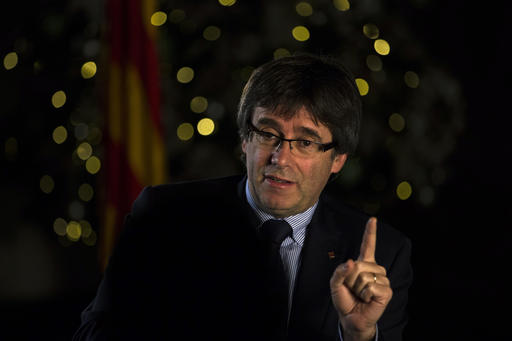Catalan leader mulls early vote on break with Spain

Catalonia’s regional president, Carles Puigdemont speaks during an interview with The Associated Press in Barcelona, Spain, on Friday, Dec. 16, 2016. Puigdemont plans to go ahead with a new referendum on independence by September despite a ruling by Spain’s Constitutional Court banning the vote. AP
BARCELONA, Spain — Separatist leaders in Catalonia plan to seek Spanish government support for a referendum on the region’s independence, but a lack of consent from Madrid will not stop them from staging the vote, the president of the regional government said Friday.
Carles Puigdemont, Catalonia’s pro-independence leader, told The Associated Press in an interview that he may seek to push forward his original plan to hold a binding vote in September 2017.
“We would need to have everything ready, but it could be earlier, of course,” Puigdemont said, when asked if his government would hasten the timetable to prevent the referendum from becoming mired in legal and political proceedings. “The welfare of Catalonia is only possible outside of Spain.”
Spain’s constitution doesn’t permit a referendum or the secession of a region. Earlier Friday, Catalonia Parliament Speaker Carme Forcadell appeared before a judge to be questioned about allowing the body’s lawmakers to debate a secession motion this year.
A thousand Catalan pro-independence supporters, including Puigdemont and hundreds of town mayors, turned out Friday to support Forcadell. Waving pro-independence flags and chanting slogans, the crowd accompanied her from the local parliament to a nearby regional court.
Article continues after this advertisementOther officials, including a former president of the region, Artur Mas, have also been questioned or are being called to testify for organizing votes in and outside of parliament about Catalonia’s future within Spain.
Article continues after this advertisementSpanish Prime Minister Mariano Rajoy recently put his second-in-command of his newly-formed government, Soraya Saez de Santamaria, in charge of thawing relations with the Catalans, but both sides blame each other for the lack of formal negotiations.
Friday’s display of support for Forcadell was aimed, partially, at putting pressure on Madrid.
A leading figure in the independence movement, Forcadell is accused of disobeying Spain’s Constitutional Court by recently allowing the regional Parliament to approve a resolution expressing its intent to press ahead with secession.
“I made clear that no court can stop the parliament from debating independence or any other issue that affects the people of this country,” she said after answering a judge’s questions for half an hour.
Catalan authorities accuse the Spanish government of using the courts to attack separatist lawmakers, but Spanish government spokesman Inigo Mendez de Vigo said Friday “in Spain the justice system is independent and does not respond to any type of pressure.”
“Nobody can have a blank check to disobey laws and act with impunity, and much less so when they are holding public office,” the spokesman added.
Polls consistently show that Catalonia’s 7.5 million residents are roughly equally divided on breaking from Spain, although a vast majority supports a vote.
Separatist sentiment began to swell five years ago at the height of Spain’s economic crisis as secessionists claimed Catalonia paid more in taxes than the region received back in investments.
Other lifelong secessionists argue only a separate Catalan state could protect their language— which is spoken side by side with Spanish in the wealthy northeastern region.
Puigdemont, 53, outlined his route to secession from Spain in the palace of the regional government. He insisted that his government wants to negotiate with Rajoy, but that the vote is non-negotiable.
“We are trapped in a decadent relationship with Spain. Our aspirations are systematically contested by a state that should be working in our favor,” he said.
Among the critics of the secessionists, there are new parties in the region that are trying to win over the support of disgruntled Catalans without breaking away from Spain.
“We are already in the European Union and in Spain. We are a rich region within a rich country, and our leaders are inventing a problem,” said Ines Arrimadas, the leader of the opposition Ciutadans (Citizens) party.
In an attempt to show Madrid’s willingness to open a dialogue on its own terms, the central government’s ministers started reviewing the 46 demands Puigdemont presented to Rajoy earlier this year, including long-time Catalonian demands for investments in infrastructure, education and health.
Rajoy has said that the government would ignore the first item topping Puigdemont’s list: a new referendum for Catalonia’s independence.